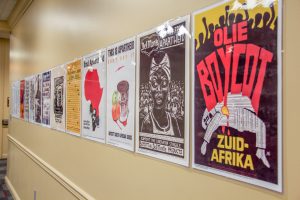The Student Senate failed to pass the divestment measure proposed by Students for Justice in Palestine at the Senate’s Feb. 27 meeting. The measure needed 41 votes to pass. Of the 62 student senators in attendance, only 39 voted aye. Three voted nay, and the remaining 20 abstained from voting.
Carolyne Wilhelm, student senator and junior international relations major, called the non-binding resolution a petition that would have shown the Student Senate supported divestment. She said the resolution would not have guaranteed action on the part of the administration, but it would have shown that the majority of students supported it.
The resolution would have requested that the university no longer invest money in, or carry the products of, companies with business ties to the Israeli government. The divestment measure was a part of the international group Boycott, Divestment and Sanctions.
The vote came at the end of a two-hour meeting. After brief speeches concerning the upcoming reaccreditation of the school and the planned Multicultural Engagement and Global Awareness Center, the senate allowed 30 minutes for both sides to make their cases to the senate.
For the first 15 minutes, students and community members against the resolution spoke. Six people rose to speak, and all lined up and waited for their turn to speak. Junior finance major Jonathan Schwarz was the first to speak. Schwarz objected to the resolution because he believed that the measure would not provide anything constructive.
“I oppose this resolution because I believe it’s student government’s goal to unify students, not divide them, which is exactly what this resolution seeks to do,” Schwarz said.
Schwarz also was concerned that the meeting was held on the Sabbath, a day when observant Jews refrain from work. He said he believed if the meeting had been held at a more convenient time for them, more people would have come to speak against the resolution.
The final speaker was Lindsey Mintz, executive director of the Jewish Community Relations Council. She was concerned that the resolution was too simplistic for such a complicated issue.
Before she was cut off for time, Mintz affirmed her group’s support for the two-state solution and claimed that the resolution, and the international Boycott, Divestment and Sanctions movement as a whole, pushed a false dichotomy.
The first to speak in favor of the resolution was Mark Sniderman, Indianapolis-based civil rights lawyer.
His opening remarks addressed those who had spoken against the resolution.
“We’ll never question your Judaism,” he said. “Please do not question ours.”
Sniderman spoke on behalf of Jewish Voice for Peace, a social justice group based in San Francisco, and said that he supported the resolution because he supported the broader BDS movement.
“And if our talk, and our engagement with BDS, unsettles some, well, so be it,” Sniderman said. “We cannot, we will not, be cowed by false and exploitative accusations of anti-Semitism. We have the right, we have the obligation, to speak truth to power and criticize the policies of any nation-state, especially those that kill in our name.”
After Sniderman’s speech, Zak Mitiche, program coordinator for SJP and leader of the group’s divestment initiative, rose to speak briefly. After Mitiche’s speech, the senate adjourned for lunch.
After lunch, Indianapolis Student Government President Rachael Junard asked whether there was any new business. Mitiche motioned to bring the resolution to debate, and his motion was seconded. The motion passed, and the senate began 45 minutes of discussion.
During the debate, one of the senators representing Sigma Zeta put forth a motion to table the vote because she felt she did not know enough about the larger issue to vote comfortably.
Junard suggested that the resolution required a larger campus conversation than senate voting would allow.
Discussion continued, and a vote was called. However, since the resolution did not pass, a decision was made to open the conversation to the entire campus.
Just four hours after the end of the session, Vice President for Student and Campus Affairs and Dean of Students Kory Vitangeli emailed all students and faculty and listed five upcoming events that will be open to the campus.
According to her email, history and background information of the Israeli–Palestinian Conflict will be given at 9 p.m. on Tuesday, March 22, in UIndy Hall. A discussion on the social issues surrounding the conflict will be held at 4 p.m. Thursday, March 31. Faculty will provide an academic perspective on the conflict at 9 p.m. on Thursday, April 7. A discussion on financial responsibility will be held the following Thursday at 9 p.m. Finally, a campus-wide forum and presentations will be given the following Tuesday at 4 p.m. The location for the final four events will be announced over the next few weeks.







